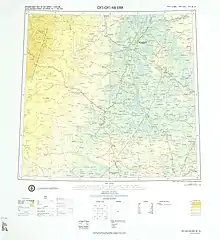Ch'i-ch'i-ha-erh
See also: Chichihaerh
English

Map including CH'I-CH'I-HA-ERH (TSITSIHAR) (DMA, 1975)
Etymology
From Mandarin 齊齊哈爾/齐齐哈尔 (Qíqíhā'ěr) Wade–Giles romanization: Chʻi²-chʻi²-ha¹-êrh³.
Proper noun
Ch'i-ch'i-ha-erh
- Alternative form of Qiqiha'er (Qiqihar)
- [1968, Kuo-chün Chao, “TSITSIHAR (CH’I-CH’I-HA-ERH)”, in Encyclopedia Britannica, volume 22, →LCCN, →OCLC, page 294, column 2:
- TSITSIHAR (CH’I-CH’I-HA-ERH), a city of Heilungkiang Province, China, is on the eastern barnk of the Nonni (Nen Chiang) River at the foot of the Greater Khingan Range.]
- 1969, Norton Ginsburg, “The Geography of China”, in Joseph Kitagawa, editor, Understanding Modern China, Quadrangle Books, →LCCN, →OCLC, page 59:
- Ninety-five per cent of the cultivated area of the country lies east of a line drawn from Tsitsihar (Ch'i-ch'i-ha-erh) in northern Manchuria to K'un-ming in Yün-nan Province. This is eastern China, and within it is the Chinese ecumene.
- 1973, Chiao-min Hsieh, “Transportation”, in Christopher L. Salter, editor, Atlas of China [中國地圖集], McGraw-Hill, Inc., →ISBN, →LCCN, →OCLC, →OL, page 74, column 2:
- From Peking air routes extend northward to Ch’i-ch’i-ha-erh in Manchuria, southeastward to Shanghai, southward to the island of Hainan, and westward to K’a-shih in Sinkiang.
- 1989, Dolores Zen, transl., Last Chance in Manchuria, Hoover Institution Press, →ISBN, page 102:
- Tou Ching-lin, head of the Ch'i-ch'i-ha-erh Railroad Bureau, came to see me. He told me that the task of changing the gauge of the rails of the track north of Harbin by the Russians began on September 3 and was completed on October 9. On October 12 a train from Moscow arrived in Ch'i-ch'i-ha-erh. A representative of the communications commission of the Soviet government came to Ch'i-ch'i-ha-erh to deliver a lecture to personnel of the Railroad Bureau. He first asked whether the staff of the Railroad Bureau understood the spirit of the Sino-Soviet agreement. He then said that if within 30 years China could manage the railroads in Manchuria by itself, control could be returned to the Chinese.
- 1996, S. C. M. Paine, Imperial Rivals: China, Russia, and Their Disputed Frontier, M. E. Sharpe, page 89:
- Ignat'ev refused to concede these points, but offered other concessions instead: Russia would not demand a consulate in Ch'i-ch'i-ha-erh or Chang-chia-k'ou (Kalgan); it would permit Chinese subjects to continue living along the Ussuri river as Chinese subjects; and it would limit to 200 the number of Russian traders in Peking.
- For more quotations using this term, see Citations:Ch'i-ch'i-ha-erh.
Translations
Qiqihar — see Qiqihar
References
- Leon E. Seltzer, editor (1952), “Tsitsihar”, in The Columbia Lippincott Gazetteer of the World, Morningside Heights, NY: Columbia University Press, →OCLC, page 1954, column 1: “Chinese Ch’i-ch’i-ha-erh (chēʹchēʹhärʹ)”
- “Ch’i-ch’i-ha-erh or Tsi·tsi·har”, in The International Geographic Encyclopedia and Atlas, Boston: Houghton Mifflin Company, 1979, →ISBN, →LCCN, →OCLC, page 153, column 2
Further reading
- “Ch’i-ch’i-ha-erh”, in Merriam-Webster Online Dictionary, Springfield, Mass.: Merriam-Webster, 1996–present.
This article is issued from Wiktionary. The text is licensed under Creative Commons - Attribution - Sharealike. Additional terms may apply for the media files.